by Jenny Rose | May 10, 2018 | Connection & Community, Emotional Intelligence, Shadows
Slowly, I’m finding online communities of writers. As I’ve shaped Our Daily Crime, I’ve connected with other bloggers. These connections mean I spend at least an hour a day reading the work of others. I’m inspired, touched, tickled and provoked, and I feel at home in these digital communities because we all share the need to write and be read. We also share self-doubt, confusion, vulnerability, loneliness, the need for connection and the problem of earning a living.
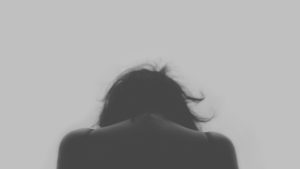
Photo by Volkan Olmez on Unsplash
Over and over again, I read about personal struggles with depression, fear and anxiety. Many a writer sits down to their daily writing practice with goals and intentions and finds him or herself unable to do anything but express the here and now of their experience of ambivalence, avoidance, distraction or block. To be a writer is to occasionally live with shame and guilt about what we meant to write, what we should have written and the quality and subject of what we actually did come up with. We all doubt our ability, our value, and whether anyone will care enough to read our words. Creative expression is a daily leap of faith.
I’ve struggled all my life with depression. In more recent years, I’ve come to understand anxiety and fear are also large parts of the feeling I recognize as depression. Over the years I’ve tried to manage depression in many ways. Some worked, at least temporarily, and some didn’t.
It hasn’t been until the last decade that I’ve finally found a way to effectively manage and even largely banish depression. It doesn’t play with me anymore. Fear and anxiety still show up regularly, but the same method works to manage them, and I no longer worry one day I’ll just give up, step over some unseen edge, and disappear into crazy, a fugue state, or death.
One day, for no reason in particular except I felt exhausted, despairing, and bored with both, I said to Depression, “You win. I give up. Why not come out of the shadows and show yourself?”
Fat and happy, secure in its power, it did just that.
The first thing that I realized was Depression is an experience, not an integral piece of me. It’s something draped around me. It can be separated from me.
The second thing I noticed was my depression is male. He walked with an arrogant male strut and swagger and he spoke in a male voice.
I didn’t name him because he wasn’t a pet, he wasn’t a friend, and he most definitely wasn’t invited to be a roommate. He was merely someone who showed up at more or less regular intervals and made a nuisance of himself. He didn’t have the manners to knock on the door, wait to be invited or give any notice of his arrival. He just appeared.
I wondered what it would take to discourage him from visiting. What made me so attractive?
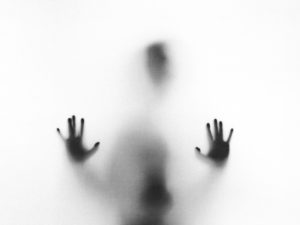
Photo by Stefano Pollio on Unsplash
Clinical depression is like a grey cave filled with fog. It numbs the senses and fills head and heart with cold, sticky, lumpy oatmeal. One is entirely alone with no hope. The simplest action, like opening one’s eyes, takes enormous effort. Depression envelopes and consumes every spark of power.
The only reason I’m in the world today is because I’m an unbelievably stubborn butthead. I’m also very nice. One does not cancel out the other, but nearly everyone persists in missing that second important point, with the result that I’m constantly being underestimated. This is a wonderful advantage in life.
Depression was no exception to the rule. When invited, he disentangled himself from me, parked his butt in a chair I pulled out for him, and began to tell me how things were going to be from now on.
On that particular day, I hadn’t showered (or the day before that, or the day before that). Annoyed by his high-handedness, I interrupted to say I was going to shower. He told me not to. Who would care? What was the point? I wouldn’t see anyone. No one would see me.
That was all I needed. I went and took a long shower. Washed my hair. Shaved my legs. Put on clean clothes and some jewelry. Depression sat in the bathroom and muttered at me. I ignored him.
I felt better then, and my irrepressible creativity began to stir, along with a childlike streak of playfulness I usually keep well-hidden. One small act of rebellion had helped me regain a tiny sense of power.
One of the things that used to happen when depression struck was that I stopped eating. I’d go all day with nothing but a salad and a piece of toast. I hadn’t eaten a solid meal for several days on this occasion. I wasn’t the slightest bit hungry (this is common), but I knew I needed to eat.
Depression didn’t like it. He threatened and complained and trotted out all the usual points. I was too fat. I hadn’t been doing anything useful and didn’t need to eat. I didn’t make enough money to deserve to eat.
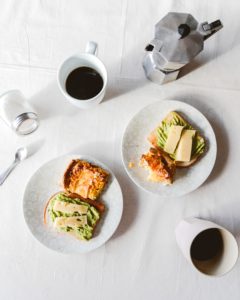
Photo by Florencia Potter on Unsplash
I put a chair at the table for Depression (I lived alone at the time), invited him to sit, set the table for two with complete place settings, right down to two glasses of water, made myself a meal, and ate. I offered him some food, but he refused. I read while I ate and ignored Depression, who sat and sulked.
Well, you have the idea. The more he protested when I wanted to take a walk, sit in the sun or work in the garden, the more stubborn I became. I politely invited him to join me in my activities, but he refused, which meant the more I got out in the world and did things the less time I spent with him. He hated my movies and my audio books. He thought walking to Main Street for an ice cream cone was a criminal waste of money, along with feeding the birds. The only activity he approved of was my work, which involved sitting for hours in front of my computer with headphones on doing medical transcription as fast and accurately as possible for only slightly more than minimum wage.
He absolutely hated my music. I quickly developed the habit of turning on Pandora first thing every morning and listening to it most of the day.
We also conflicted over sleep. Depression said there was no point in getting up in the morning because no one would notice. No one would care. In fact, the only things really worth doing in life were working and sleeping. This attitude ensured I set the alarm for 5:30 a.m. and walked every day at dawn.
I didn’t ask him to leave. I didn’t fight or struggle. I made sure he had plenty of space and a good pillow in my bed. I gave him a spot at the table and a seat in front of the TV. I took out a clean towel for him and invited him to browse in my personal library.
Every single time he told me not to do something I did it, no matter how much I didn’t want to. I was pleasant, noncompliant, resistant and stubborn as a mule.
You know what?
He went away.
One day, he was just gone.
I knew I’d found the key.
Externalized, Depression suddenly became more pathetic than terrifying. He was so predictable, and so limited. All he had to say were the same things he’d been saying all my life. He was boring. He was like a batty old uncle who must be invited to every family gathering and tells the same interminable stories year in and year out.
He came back, of course, but for shorter and shorter visits at wider and wider intervals.
“Back again, I see,” I’d say. I’d set a place at the table, take out a clean towel, make space in the bed and on the couch. I’d realize I was sliding again and concentrate on eating more regularly, exercising, playing music, putting flowers on the table or maybe scheduling a massage.
I tried to have conversations with him, but Depression had no conversation, just the same tired monologue, mumbling and whining. He was really quite sad. He stopped spending the night and then gradually stopped visiting altogether.
I guess he was no longer getting what he needed from me.
Fear and anxiety are still regular visitors. Things are different here in Maine. I don’t live alone, for one thing. I still play imaginary games, but only in my head. Still, when either fear or anxiety show up, I recognize them. (Anxiety bites her fingernails; I always recognize her hands.) I don’t try to keep them away and I don’t try to hide from them.
I focus on giving them no power. I don’t buy into their catastrophizing. I appreciate they’re trying to keep me safe, poor things. All they can do is make up terrible stories about what might happen and then sit, paralyzed by their imaginings. I know they’re wretched. I wish I could help. I try to be kind — at a distance. They usually don’t stay long.
This experience is the sort of thing I used to hide, but I realize now my struggles are not unique. I’m inspired by the creativity, honesty and vulnerability of other writers. Coping with depression, anxiety and fear is like figuring out how to eat. Every body is different. Everybody needs to find their own path to healing, health and sanity. At times, it’s difficult to break through social expectations and shoulds and make a complete left turn into something creative, intuitive or outside the current norms.
Still, nothing succeeds like success. Turning Depression into an externalized character helped me see I didn’t have to define myself by it. I could choose to set aside that label and all it implies. Once I truly believed I had the power to choose, everything changed.
Sometimes, running away from sudden or passing danger is appropriate. However, running from these chronic spectres dogging my heels has not worked. I can’t get away from them. I can’t avoid or evade. Being chased by anything is fearful. The moment when I stop running, turn around and deliberately go toward whatever threatens me is the moment in which I begin to regain power. Monsters suddenly become mice. My own fear and abdication of power are what made them monstrous. I don’t need to hide. I don’t need to defend. I only need to consistently and patiently demonstrate I will give them nothing they want so they choose to leave me.
It helps when they tell me what to do.
Don’t tell me what to do!

Photo by Senjuti Kundu on Unsplash
All content on this site ©2018
Jennifer Rose
except where otherwise noted
by Jenny Rose | Mar 29, 2018 | Connection & Community, Emotional Intelligence, Shadows
As an oral storyteller, I’m committed to gathering old tales from all over the world and retelling them because they contain blueprints for life. Each story is a teacher, a small piece of code, a seed, a fragment of wisdom, a snippet of DNA. Stories speak to us about who we are, who we have been and who we might yet be. They speak in the voices of place, people, history and culture.

Photo by Alan Chen on Unsplash
Story does not exist without storytellers. Literacy is not necessary, as long as people remain connected enough to pass story on orally. A culture which unravels and frays in its ability to form healthy connections and bonds and at the same time stifles the acquisition and sharing of knowledge is in grave danger of losing stories, and when old stories are lost much of the collective wisdom of our ancestors is lost with them. We become crippled and impoverished. We lose our way in the world and we have to spend time and energy reinventing wheels we learned how to make hundreds of years ago.
As a storyteller, then, I come to you this fine spring week when the snow is ebbing in Maine, leaving behind rich, greasy mud, with the old story of the wolf in sheep’s clothing.
Every old story is in fact many stories. A piece of oral tradition is like a many-limbed tree. As it grows and matures it branches out over and over. Every teller who passes on the tale adds or takes away a piece of it, reshaping it according to the teller’s context in history and place. Still, the skeleton of the story remains recognizable, because the bones contain the wisdom, the old truth, the regenerative pieces reanimated over and over by those of us who share them.
The essential truth contained in the idiom “a wolf in sheep’s clothing” has appeared in many times and places. According to my research, the first time was in the Bible, in the Gospel of Matthew, as a warning against false prophets. The sermon goes on to suggest actions speak louder than words. Thereafter, the phrase was repeated in other Christian religious writing and from there entered into European vernacular. A Latin proverb arose: “Under a sheep’s skin often hides a wolfish mind.”
A 12th century Greek wrote a fable about a wolf who changed his appearance in order to get access to ample food. He put on a sheepskin and mingled with a flock of sheep, fooling the shepherd. The disguised wolf was shut up with the sheep for the night. The shepherd decided he wanted mutton for his supper, so he took his knife and killed the deceitful wolf, mistaking it for a sheep. Here is a branch in the story tree. The Gospel reference warns against deceitful teachers. The Greek fable warns evil-doing carries a penalty. The bones of the story — the consequences of a wolf disguising itself as a sheep — are the same. The story is now two-dimensional. Such pretense is dangerous for both wolf and sheep.
Another iteration occurs three centuries later in the writing of a 15th century Italian professor. A wolf dresses himself in a sheepskin and every day kills one of the flock. The shepherd catches on and hangs the wolf, still wearing the sheepskin, from a tree. When the other shepherds ask why he hung a sheep in a tree, the shepherd replies that the skin was of a sheep, but the actions were of a wolf. There it is again: Actions speak louder than words.
Aesop wrote two fables having to do with wolves gaining the trust of a shepherd and killing sheep, but the wolf is undisguised in these cases. Even so, the common theme is clear. A wolf is a wolf, and cannot be trusted with sheep.
In the 16th, 17th and 18th centuries, Italian, French and English writers adopted versions similar to the early 15th century Italian tale, in which the wolf pretends he is not a threat to the sheep.
Most of us know the tale of Little Red Riding Hood, whose origins can be traced back to 10th century European folk and fairy tales. In the familiar modern version, a wolf disguises itself as Red Riding Hood’s grandmother and the innocent too-sweet maiden is fooled and subsequently eaten.
My favorite story of wolves and, in this case, goats, comes from my own childhood, the tale of the wolf and the seven kids (young goats). The mother goat must leave the house and warns her seven children about the wily wolf who might try to gobble them up. She says they will recognize her by her sweet voice and white feet, and they mustn’t open the door to anyone else. I was mightily amused by the wolf’s machinations in trying to fool the kids: Swallowing honey to make his rough voice sweet, whitening his black feet with flour. Of course, he does fool the kids and they are eaten, but, much like Little Red Riding Hood, the kids are saved from the wolf’s stomach in the end.
As an adult, this tale doesn’t seem nearly so amusing.
Lastly, modern zoology makes use of the term “aggressive mimicry,” which describes a method of deception by an animal so it appears to either predator or prey as something else.
I’m deeply troubled by what I see going on around me in the world. It appears many millions of people are no longer able to discern the difference between wolves and sheep, and this is creating dire consequences for all life on Planet Earth.
How did this happen? Why did this happen? When did this happen? How are we producing college graduates who don’t recognize wolves in sheep’s clothing? What kind of a so-called educational system, public or private, produces such myopia? For two thousand years we’ve understood the dangers of failing to clearly see the difference between sheep and wolves. Such a failure of judgement is bad for the wolves as well as the sheep. Tracing this old tale through time (when most of the world’s population was largely illiterate and uneducated), clearly shows us this is a learned skill. Little Red Riding Hood, the seven kids and several confused shepherds, all innocent, naïve, and inexperienced, had to learn to recognize a wolf when they saw one, or starve or be eaten. Critical thinking is not an innate skill. Parents, teachers and leaders must actively teach it.

Photo by Michael LaRosa on Unsplash
Here is a wolf. It’s an apex predator; intelligent, flexible and canny. The wolf is evolved to survive and pass on its DNA. It’s not confused about what it eats or the meaning of its life. Its job is to do whatever is necessary to survive and successfully reproduce. As a predator, wolves are an essential part of the complex system we call life. A healthy population of wolves benefits both the land and prey animals.
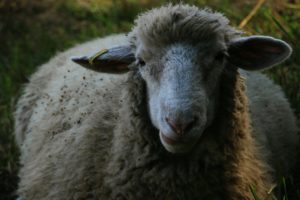
Photo by Jamie Morris on Unsplash
Here is a sheep. It’s an herbivore, a prey animal. It’s evolved to produce milk, meat and wool, survive and pass on its DNA. It eats grass. It too is an essential part of the web of predator (including humans), prey and plants. Its presence, properly managed, benefits the land and predators.
One can certainly throw a wolfskin over a sheep and say it’s a wolf, but that doesn’t make it so. Now we have a sheep in the throes of a nervous breakdown, but the animal is still a sheep. It still needs to eat grass. We cannot change a sheep into a wolf.
Likewise, a wolf wearing a sheepskin does not begin to crop grass. Wolves eat meat, no matter what kind of a skin they’re wearing. A simple shepherd might be fooled by a single glance in the dusk if the disguised wolf mills among the sheep, but five minutes of observation will quickly reveal the truth. Sheep do not tear out one another’s throats. A wolf cannot be changed into a sheep.
The wolves of the world, those who prey on others, naturally have a large inventory of successful speeches and manipulations. They study their prey and learn quickly how to take advantage of it. They are everywhere, in politics, religious organizations, schools and cults. They’re athletic coaches and businessmen, people of influence and power. They’re shadows behind conspiracy theories and cults like QAnon. They disguise themselves with projection and gaslighting, mingle freely with their prey and pick them off, one by one.
In the natural world, an overpopulation of wolves eventually runs out of prey animals. At that point, the wolf population goes down dramatically while prey animal populations recover. Nature seeks a balance of life, and if we create endless flocks of fat, stupid, blindfolded sheep, the grass will run out, wolves will increase, and slaughter will commence as the sheep begin to starve for want of food.
That’s a lot of destroyed land, dead sheep, fat and happy wolves and then, in the next generation, a lot of young wolves starving to death and, (one hopes) a few smarter and wiser sheep and shepherds.
People say we’re a superior species to wolves and sheep. I don’t see much evidence of that recently. We can’t seem to remember what we once knew well. We teach our children how to press buttons, look at a screen, and pass a standardized state test, but they can’t tell a wolf from a sheep, and neither can we. The wolves are not confused, but the sheep are milling around aimlessly like … well, like sheep, ripe and ready for slaughter. We’ve allowed ourselves to be brainwashed into believing our true nature is expressed by appearance, words and socioeconomics. Actions don’t count, and neither does DNA. Off we skip to the slaughterhouse, following honey-tongued wolves dusted with flour, who praise us for our compassion, compliance, inclusivity and political correctness while drooling at the prospect of all that food. Meanwhile, our planet degrades so no one else is properly fed and natural checks and balances are destroyed. Even the noncompliant, troublemaking sheep who manage to escape slaughter will starve. So will the wolves, eventually, after they’ve devoured everyone else.
Maybe then the complex system of life can begin to heal. I hope so.
In the meantime, I’ll be separating wolves from sheep and telling stories.
All content on this site ©2018
Jennifer Rose
except where otherwise noted
by Jenny Rose | Nov 16, 2017 | Connection & Community, Emotional Intelligence, Shadows
I recently had a conversation in which I learned about the degree to which my anxiety affected at least one of my now adult children.
Parenting is an ironic business. Having been a chronically anxious child myself, always feeling unsafe and afraid, I strove mightily to protect my own children from any sort of fear or insecurity. Of course, I did this by assuring them all was well, all the while fearing all was not and never would be well. Being no less intelligent than I am, they heard the words but knew the truth of my feelings, and thus their trust in me was damaged, an exact replay of what happened between me and my own mother. You know, that thing I was never going to do when I was a parent!
Well, I’m humbled. I’m also sad, because I didn’t want either of my kids to battle with the burden of anxiety. It’s a hard way to live.
However, I understand parenting, at best, is an imperfect process, and I try to hold my mother and myself with gentle arms regarding our choices as mothers. Parenting less than perfectly does not imply a lack of love. I know we both did the best we could with what we had at any particular point in time. No parent can do more.

Photo by Liane Metzler on Unsplash
Still, this kind of revelation is a far cry from my hopes, dreams and intentions when I held my newborns. On the other hand, it speaks to the strength of my relationship with my adult children that they can tell me the truth about their experience and I can hear it.
After our conversation, I’ve thought a lot about fear and anxiety. I can’t go back and reparent, but I wonder if I might, even at this late stage, find a way to extricate myself from the insidious tentacles of anxiety. I’ve been thinking about my life and trying to understand exactly what the roots of my anxiety are.
According to an Internet search, fear is “an unpleasant emotion caused by the belief that someone or something is dangerous, likely to cause pain, or a threat.” Fear is considered real, in that it’s right there in front of us, and elicits an immediate response.
Anxiety is an “emotion characterized by an unpleasant state of turmoil; a feeling of worry, nervousness or unease, typically regarding an imminent event or something with uncertain outcome; a nervous disorder.” Anxiety is differentiated from fear by being more diffuse and generalized and focusing on imaginary outcomes and possibilities. Physiologically, it elicits the same response, and therein lies part of the problem.
Both are unpleasant emotions or feelings affecting us physically, intellectually and emotionally. We evolved to respond to fear in certain specific physiological ways, returning to baseline as the fear passes. Fear is a valuable feeling, helping us discern and avoid danger. I certainly don’t want to disable mine. I know the feeling of fear, but it’s not a frequent experience.

Photo by Stefano Pollio on Unsplash
Anxiety, on the other hand, is a chronic state for me. I can’t remember ever being free of it. I’ve developed a lot of coping mechanisms over the years, some more effective and appropriate than others, but I can’t imagine what life would be like without it. As far as I can tell, the feeling of anxiety provides no benefits whatsoever to me or anyone around me. It’s highly contagious and negatively impacts others in my life, to say nothing of the damage it does to me. We are not constructed to tolerate the chronic level of physiological arousal produced by anxiety.
I never before actually looked up these words, and I’ve never had the above distinctions between fear and anxiety until this week. I conclude that I have no problem with my relationship to fear, but I’m a slave to anxiety.
I find a kind of mordant humor in having a chronic unpleasant feeling regarding uncertain outcomes. Excuse me? All outcomes are uncertain for everyone until they happen! Most of us operate most of the time as though we know exactly what will happen next, but we don’t. I’ve lived long enough to know that’s all an illusion. Nobody knows what’s going to happen next on any level. For some reason, I’ve given that fact the power to make me miserable.
I have a powerful imagination, which makes me a good writer and creator. However, it also occasionally makes me captive to my own stories. I forget that my stories are just that — stories. I make them up, tell them to myself over and over, and behave as though they’re true, never really noticing when they diverge from reality. In my head, it’s all so real. I do know the difference between a story and what’s real, but I have to remind myself to keep the two separated.
Some stories are so old and deeply ingrained it takes a cataclysm to make us realize they’re not true, and then we have to deal with being wrong and all the consequences, an uncomfortable, humbling and messy process.
If my anxiety is rooted in uncertain and imaginary outcomes and possibilities, it seems obvious I can disable it with a little discipline, a dash of surrender to uncertainty, a lot of presence and the will to change. I’m chagrined by the possibility my anxiety is a lifelong bad habit as much as anything else. Could that be true? Yikes.
I wish with all my heart I’d been a better equipped and less distressed parent, but I remind myself I can’t go back. I can’t begin parenting again from ground zero. I can’t go back to the young woman I was and explain all this and give her the support and safety to actively choose to turn away from anxiety before starting a family. There’s only today, so many years later, as I sit with my laptop in my lap and the sun coming in the windows, glancing at my notes, thinking and writing.
I know all I’ve ever wanted for my own mother is health and happiness. I want the same for my kids. I suspect Mom and my sons also want that for me. Perhaps it’s time for me to shape an anxiety-free life now, not only for my own sake, but for those closest to me as well.
We build our lives on outcomes, one after another, more than we ever notice. We remember the spectacularly good and spectacularly bad outcomes, but what about the countless others? Outcomes are complex, not black and white. Outcomes can create visible and invisible ripples that last a lifetime. I can hardly think of a more fruitless endeavor than worrying about or trying to control outcomes. I’ve survived every outcome to date. What makes me think I won’t continue to do so — until I don’t, of course? But the outcome of death is largely out of my control, too. Why worry?
There are so many things I’d rather do than struggle with anxiety!
There are so many stories to imagine, share and write, rather than keep in my head and hurt myself with!
Anxiety is too expensive. I’m not interested in maintaining it anymore.
Better late than never. My daily crime.

Photo by Senjuti Kundu on Unsplash
All content on this site ©2017
Jennifer Rose
except where otherwise noted
by Jenny Rose | Nov 9, 2017 | Connection & Community, Emotional Intelligence, Shadows
It’s hunting season in Maine. Several days ago a woman was accidentally shot and killed on her own property at 10:30 in the morning by a hunter. We frequently hear shots in the neighborhood, and although we don’t allow hunting on our land, there’s nothing to prevent a hunter wandering in, attracted by the deer, game birds and waterfowl on our 26 acres.
I bought a cheap orange vest I can wear over my coat for my morning walks.
Wearing orange during hunting season is such a simple and obvious safety tactic that I didn’t think twice about doing it, but the first morning I went out with the vest on I discovered a lot of complex feelings about being so visible in the world.
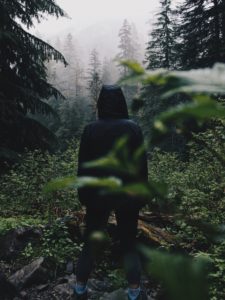
Photo by Andrew Spencer on Unsplash
The first thing I noted was how dangerously exposed I felt. I do not want to be seen by human eyes. I don’t mind if the wildlife sees me, but if they do I’m less likely to see them, so I do my best to move quietly and unobtrusively through the landscape, wearing neutral, natural colors. I stop and sit or lean against a tree for long stretches, hardly moving, watching the river and listening to the woods around me.
The orange vest shrieks, “Look at me! I’m here!” and I hate it. It’s more than just my preference to blend in to backgrounds and maintain protective camouflage. It seems a life-and-death necessity to avoid being seen.
I’ve been aware of my hypervigilance for some time now. I’ve never been comfortable in crowds. If I’m not able to position myself in a corner or with my back to something solid and watch, listen and evaluate, anxiety quickly disables me. I need to know where the exits are in any indoor space.
This is interesting, as I’m fascinated by people, and people watching is one of my favorite activities. I’ve frequently longed to be invisible, to watch and listen freely and leave no trace of my presence. If I could be invisible, I imagine I’d still get overstimulated by noise, activity and technologically-generated energy, but I’d feel safer.
The strength of my feelings as I donned the orange vest begged the question: What happens if somebody sees me? What’s so terrible?
That’s easy. Criticism happens. Judgement, abuse (verbal, emotional, physical), negative feedback happen. If I’m seen doing anything, I’m sure to be doing it wrong (according to the observer, anyway). I’m sure to disappoint. I’m sure to be inadequate or inappropriate. My clothes are wrong. I’m clearly behaving like a slut, going out on my own land in my men’s Carhartt jeans and old boots. My hair is wrong. My choices are wrong. If I’m heading for the northern boundary of our land, I should be walking the southern border. I’m too noisy. I’m in someone’s way. I’m too slow. I’m wasting my time and should be doing something more productive. I’m irresponsible. I’m lazy. I’m selfish. I’m scaring the fish. I’m scaring the birds. I’m scaring the animals. I should be ashamed of myself.
Wow. No wonder I don’t want to be seen. Who knew the perils?
I didn’t know, until my ugly orange vest dredged all this up from my swampy subconscious.
On subsequent mornings, as I’ve walked in my orange vest, I’ve thought about the tension between being seen and avoiding being seen. How can anyone be in the world without being seen, even the most self-effacing of us? Refusing to be seen is refusing any healthy human connection. How do we get hired without being seen, or accepted for college? How do we follow our creativity or passion if we’re afraid to be seen? How do we engage in face-to-face conversation or discussion, or participate in politics or as a volunteer?

Photo by Peter Forster on Unsplash
On the other hand, how much exposure is too much? How can we avoid being seen by the shooter at the concert, in church or in the movie theater? We seem to be gradually becoming more and more captive to the Matrix, which makes us increasingly vulnerable to identity theft, technological sabotage and cyber-based terrorism.
I sometimes feel I carry protecting my privacy too far. I can’t say I regret not being on Facebook and other social media, as I’ve yet to hear about anything there that I need. On the other hand, not having a cell phone in today’s world creates a lot of problems for me. My personal issues with being seen are in the context of much wider social issues about exposure and safety. I don’t have any answers for the wider social problems. I wish I did.
For myself, though, it’s clear I need to address some of my subconscious beliefs about what will inevitably happen if I am seen. I’ve also developed a thicker skin about being criticized and judged. At this point in my life I’m really not much interested in the criticism and judgement of others. What interests me is how I feel about myself. My list of terrors about what happens if I’m seen is decades out of date, and I’ve already survived those consequences many times over. More of the same is boring rather than terrifying.
I’m stuck with my orange vest for several more weeks, and that’s OK. I’ve come to terms with it. In fact, I’m grateful to it, because it exposed some old wounds that needed attention. I’m stepping into plain sight In many ways in my life, this blog being one of the most prominent and challenging. Now I’ll practice walking this land in plain sight as well.
All content on this site ©2017
Jennifer Rose
except where otherwise noted
by Jenny Rose | Sep 14, 2017 | Connection & Community, Emotional Intelligence, Shadows
Power lies beneath the layers at the center, the heart, the core. All avenues of thought, all paths of inquiry lead back to power. What is it? Who controls it? How do we manage and maintain it? Power is the fuel of life. Every relationship is rooted in power. Managing our power is the key to managing our lives at every level, physical, emotional, creative, sexual, spiritual and intellectual.
Narcissists stalk emotional power. They seek it, they lust for it, their voracious hunger and need drive them to control it. They are a yawning abyss that can never be filled because they lack the ability to generate their own emotional power. They will never cease hunting for prey.
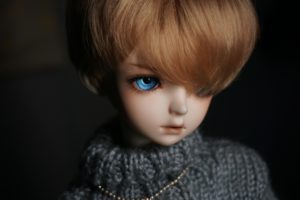
Photo by Rain Wu on Unsplash
The prey of the narcissist is carefully addicted and programmed with romance, charisma, and sex into becoming emotional power machines, set and calibrated to take full advantage of finely-gauged specifications of the prey’s need and vulnerability, so as to provide an unending stream of high-quality emotional power on which the narcissist gorges at will: The fine wine of our love, the exotic spices of our passion, the honey of our confusion, the refreshing tang of our jealousy, the nectar of our anguish and the bitter dark chocolate of our despair. Eagerly, we spread our longings, hopes, fears and fantasies before the icy coruscating mirror concealing the narcissist’s true nature. Narcissists manufacture networks of emotional power machines and pit us against one another in order to obtain ever more abundant, complex and complicated fuel. We are not released until we malfunction, and then we’re contemptuously eliminated (but not freed) to make room for a shiny new machine, and we languish until called for again.

Photo by Gary Bendig on Unsplash
The only hope of escape and healing lies in power, the center, the heart, the core beneath the layers. We must cease to hoard, deny, silence, or give away our emotional power. We must claim it, excavate it, call it by name, learn the flavor and scent of it. We must weep with it, rage with it, release it in righteous orgasm, create with it, fight with it. We must look through its unclouded eyes and follow it, wherever it takes us. We must pray with it, surrender to it and adore it. We must soar within its rapturous fiery wings and plunge into its healing green water. We must build a cosmos out of our emotional power and fill it with galaxies, adorn it with jeweled planets and sow it with shooting stars.
We must defend our emotional power with our lives, for without it we cannot live. We must seduce and enchant ourselves with the rapture of our own emotional power so we cannot be captivated by the scintillating mirrored eyes of the narcissist, for if we’re captured by those mirrors we’ll find nothing but our enslavement and performance as emotional power machines reflected back to us, and the stench of the charnel house will invade our souls.
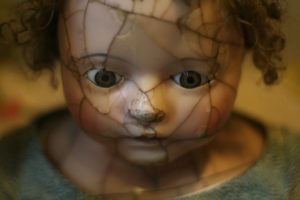
Photo by Aimee Vogelsang on Unsplash
We must look in those glittering mirror eyes, look deeply, look well, and say, “Ah, here is my own reflection, my ravishing emotional self, entirely naked and unashamed.” We must say, “No, I will not be your emotional power machine, no, you can give me nothing that wasn’t already mine, no, I name you Narcissist and I know your terrible secret: You are powerless without your prey,” and turn away, dance away with our bountiful bared breasts and strong hips, pressing our lips to our own shoulders with love because we have everything we need, everything we want, as we embrace our own emotional power beneath the layers in our center, in our heart, in our core.
For more information on recognizing, understanding and managing narcissists and their behaviors, explore narcsite dot com, created and written by a narcissist. If you suspect you have had or now have a narcissist in your life, read ‘The Prime Aims’ on that site for clarification. If you are now or have been entangled with a narcissist, seek help and support immediately if you have not already done so. Your life is at risk.
All content on this site ©2017
Jennifer Rose
except where otherwise noted
by Jenny Rose | Aug 31, 2017 | Connection & Community, Emotional Intelligence, Shadows
I’ve developed a practice of jotting down a list of events, conversations and observations at the end of every day, not only as a repository of creative prompts but also to identify patterns in my experience. During the last few weeks, perfectionism has appeared repeatedly in my daily lists, my own pursuit of it as well as my observation of it at work in others.
The first post I ever wrote was about people pleasing . As I draw word maps and play around with the idea of perfectionism, it’s impossible to separate it from people pleasing. They seem to be shackled together. When I think about that duality, it occurs to me perfectionism, like people pleasing, is a total abdication of power.
Trying to please others is always about someone else’s needs, and it’s always attached to a particular outcome I have no control over. Perfectionism feels the same way to me. It’s not about me. It’s not centered in my integrity or intention. I don’t even get to define what perfect is. It’s always about striving to meet the demands of others in order to obtain something I think I need from them.
Perfectionism is an old habit for me. I clearly remember trying to make beds perfectly, trying to sort laundry perfectly, trying to take care of my younger brother perfectly and trying to learn to tie my shoes perfectly. In fact, the entirety of my earliest memories are of struggling to be perfect in order to stay safe.
It didn’t work.
The problem with the concept of perfection is that it’s a chimera, something desperately hoped or wished for but impossible to achieve. Perfection is not static. It’s as elusive as a dust mote dancing in a shaft of light. The second we try to capture, control or define it, it vanishes.
When I imagine a perfect lover, a perfect friend, a perfect house or a perfect day, what I’ve done is pin the butterfly of perfection into a velvet-lined case. In the effort to preserve it, I’ve killed it. To describe perfection as always winning, unchanging, uncomplicated or in any other terms is to limit it, and, diminished, it crumbles into dust.
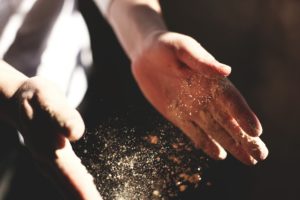
Photo by Austin Ban on Unsplash
My best view of perfection is always over my shoulder. Perfection defies my expectation and agenda, but I glimpse it clearly as it passes by me and dances away in the distance. Whatever has been; that was perfect. Whatever is now is perfect. All the nows of my life, strung together like pearls on a silk thread, rippling behind me in the current of my passage, are perfect, including, and maybe especially, the knotted repairs, the frayed silk, and the variations in colors, shapes and sizes of the nows.
Perfection is nothing more than a frame. If perfection means without flaw, what is a flaw, exactly? That’s subjective, too. A flaw is just another frame. Either perfection or flaw can frame a moment, a day, a life.

Photo by Nathan Dumlao on Unsplash
I’m the only one with the power to define what perfect means in my life. I don’t have to buy in to anyone else’s interpretation. A perfect score, a perfect grade, a perfect 10, a perfect record, a perfect job, a perfect gift and all the rest are powered by competition and outcomes. Even if I win or achieve the outcome I desire most, that moment of perfection is fleeting, a brief second of shimmering wings, and then the butterfly of perfection has once again flown and the current of my life sweeps me into new territory.
Perfectionism, for me, is a compulsion and an addiction. It seduces me with promises of feeling valued and loved, but it never delivers. Practicing perfectionism is practicing self-hatred and fueling my internal critic until I’m paralyzed and beaten. Perfectionism renders me anxious and powerless. I still find myself in its grip occasionally, but I recognize the taste of it now. It’s the taste of futility, of exhaustion and unending effort. It’s empty and barren.
Those who hold us to their standards of perfection are not loving us. They’re controlling us, and people who control others do so because they cannot control themselves. Their expectations of perfection are about them, not us. There is no love there, no success, no safe harbor. Requiring perfection from ourselves murders our ability to live authentically, freely and fully.
My youngest son, wise beyond his years, used to say to me, “Mom, perfection is not a goal.” In those days, the pursuit of perfection still had me by the scruff of the neck and pleasing people was the only hope I had for earning love.
Now I’m older and feistier and I don’t want the pretense of love I have to earn. Perfection doesn’t interest me. I can do much more than achieve perfection. It’s not deep enough, not wide enough and not juicy enough. The false promise of perfection contains nothing I want or need. I want clouds of goldenrod and fields of butterflies and a long necklace of nows I collect, string and knot into place, one perfect pearl at a time.

Photo by Kelly Sikkema on Unsplash
All content on this site ©2017
Jennifer Rose
except where otherwise noted
















